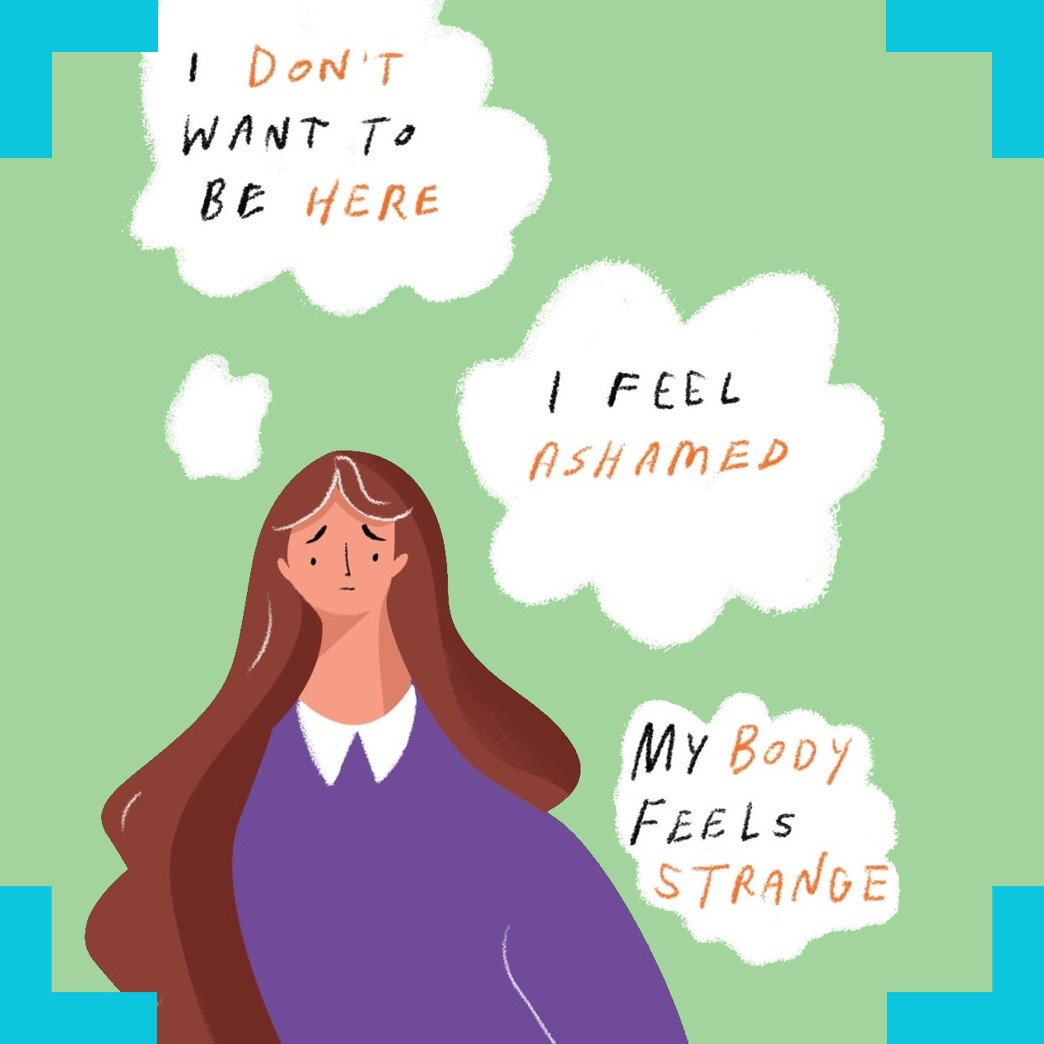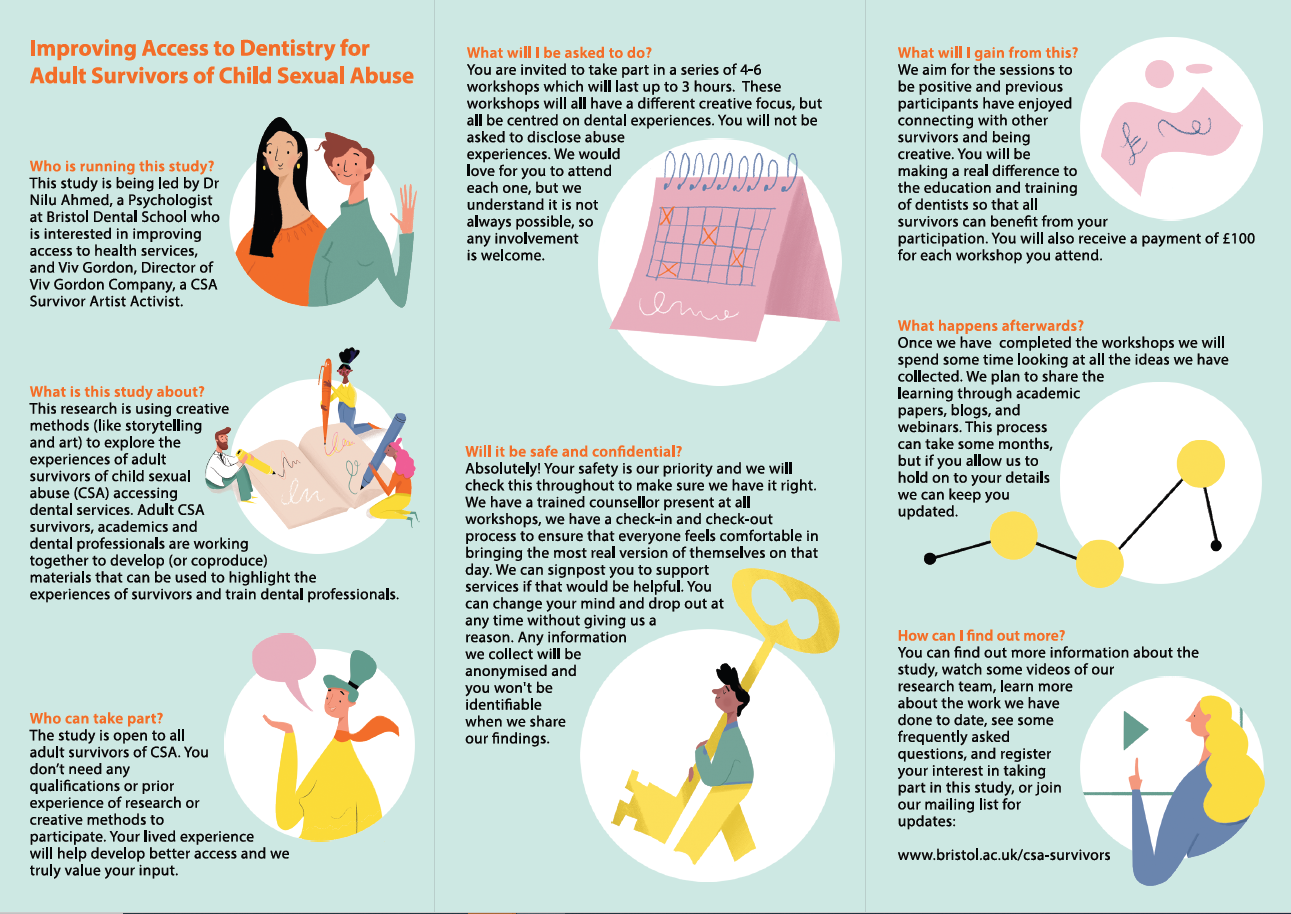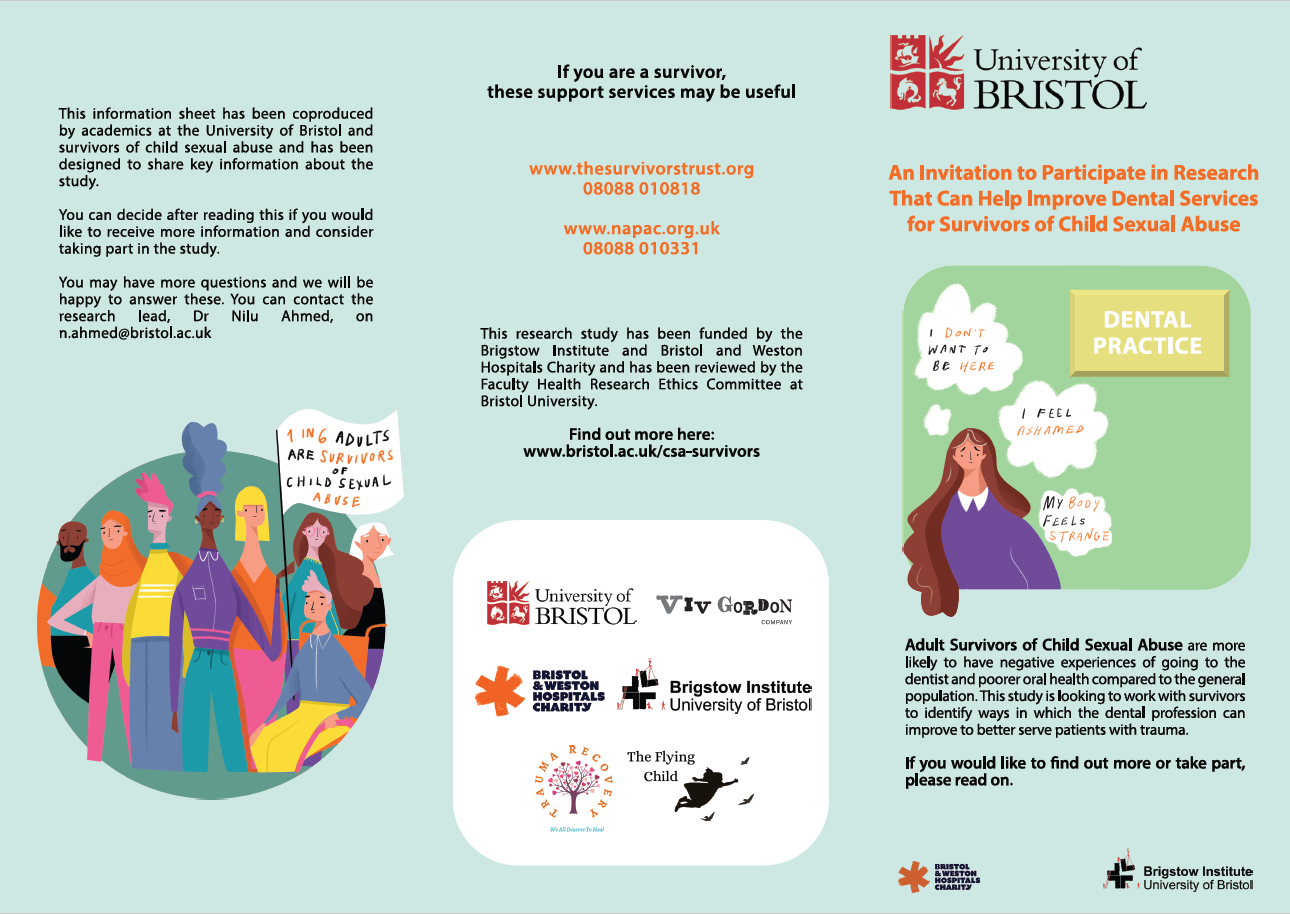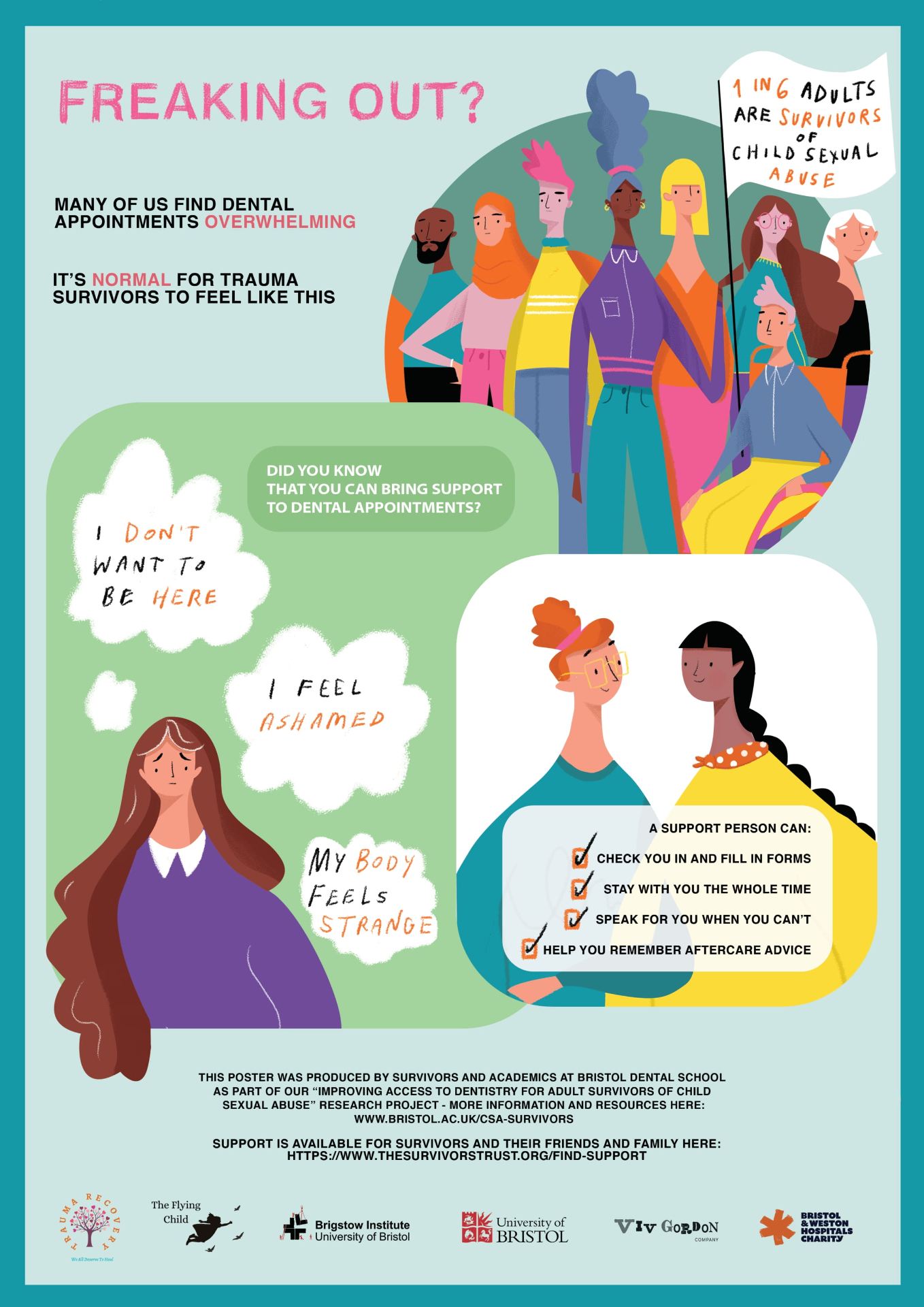Improving Access to Oral Health Services for Adult Survivors of Child Sex Abuse (CSA).
How can coproduction between researchers, dental professionals, and adult child sexual assault survivors lead to new approaches to dental teaching and training which makes healthcare accessible, inclusive, and responsive to all patient needs?

There are 11 million adult child sexual abuse (CSA) survivors in the UK. Research has shown that many CSA survivors have poor oral health, face barriers accessing oral health care, and have higher rates of dental anxiety. Given the prevalence of CSA, dental health professionals often unknowingly work in close contact with survivors of CSA, this can lead to potentially triggering unwanted memories or a traumatic response. Given the proximity and intimacy required in dental care alongside the differential in power dynamics between a dentist and patient CSA survivors may feel an exacerbated lack of power. There has been limited global research conducted on how to deliver best care to CSA survivors, and, until this research, none in the UK.
Despite the prevalence of CSA and associated poor oral health, in the UK there is no formal component in the five years of dental education on working with trauma or CSA survivors. To make healthcare accessible and inclusive in the 21st Century it is crucial new approaches to teaching and training are developed to respond to all patient needs.
What did the project involve?
The overall research aim of the project was to coproduce a trauma-informed resource to educate both survivors and dental professionals that would have applicability across other health professions.
The initial project objectives were to:
- Create a CSA Survivor Working Group.
- Create a Critical Friends Network of academics and clinicians (some of whom are themselves survivors).
- Create safe spaces to understand CSA survivors’ experiences of oral health services, understand barriers, and document good practice.
- Coproduce a survivor led educational resource to raise awareness for survivors and dentists.
- Identify what training dental education staff and established dentists need to improve the experience for CSA survivors.
The researchers formed the Survivor Working Group with Survivor Activists from their network established in previous work funded by Brigstow where two focus groups (one with dentists and one with survivors) highlighted gaps between dental professionals’ knowledge and survivors’ needs. Outcomes of this were shared in a webinar and a network of survivors, oral health specialists, and academics for the work proposed in this project was established. The researchers deliberately chose to work specifically with survivors who are active in raising awareness of the CSA and oral health/health as they would have a greater emotional resilience to this work. This did not mean that they did not provide support and make careful risk assessments, but these individuals were familiar with talking publicly about their experiences and will have collected other survivor experiences through their own work which they could advocate for, and had reach to other survivors. The researchers continued to work closely with SARSAS and partners to maintain mental wellbeing of the research team and collaborators.
The project adopted a co-production model where all the expertise and knowledge everyone brought to the process was equally valued. The researchers believed everyone involved in the study wanted the same outcome – improved oral health services for CSA survivors, but that all parties would have different perspectives on how this can happen. This is why they included all voices to try and maximise opportunities to make change across education, training and practice.
The researchers worked towards the development of a trauma-informed toolkit. To do this they held a series of 9 half-day workshops where they invited the Survivor Working Group to attend. The workshops were led by a creative artist who worked with the survivors to create a poster to be tested as an educational tool with a wider group of survivors and with dentists. The 9 workshops were held between April and July 2022. There were 5 creative themed ones where outputs were collaboratively generated, and then a further 4 deciding on and refining the outputs. The 9 workshops were focused on:
- Autoethnography
- Power
- Stigma
- Models of illness.
- Coproduction
- A discussion of the poster with the artist.
- A review of the poster from the artist.
- A discussion of key information to go into the participant information sheet.
- A review of the information sheet and final poster.
Who are the team and what do they bring?
- Nilufar Ahmed (Dental School, University of Bristol) is an advanced qualitative research practitioner with a multidisciplinary academic training in Psychology, Sociology, Gerontology, and Human Geography. Her work is rooted in an antiracist and intersectional framework, and she brings these lenses to all her work. She has extensive experience of successful Patient and Public Involvement (PPI) and community engagement expertise. She is active in community work and her research uses coproduction with community members and students as coresearchers. She has interests and experience in working with adverse childhood experiences and with adults with childhood trauma.
- Viv Gordon (Artistic Director, Viv Gordon Company) is an activist with extensive experience as a theatre maker, arts/mental health campaigner & survivor-activist grounded in her lived experience of Child Sexual Abuse. The Viv Gordan Company is a campaign to increase visibility, voice and community with adult survivors of Childhood Sexual Abuse.
- Patricia Neville (Dental School, University of Bristol) is a Lecturer in Social Sciences and a sociologist who has developed expertise in the sociology of oral health, with a particular interest in health professions, professionalism and gender and diversity issues within the dental profession. She has expertise in social justice and heath inequalities.
- Angela Hague (Dental School, University of Bristol) is a Senior Lecturer and Mental Health Champion for Bristol Dental School. She leads a vertical Theme of Lifelong Learning and Wellbeing Theme in the dental curriculum, and workshops within the Theme of Evidence Based Practice.
- Tamara Khayatt (Dental School, University of Bristol) is an Oral Surgeon and Clinical Lecturer at Bristol Dental Hospital.
What were the results?
One significant outcome of the project was a co-produced information sheet inviting CSA survivors to participate in the study. After receiving feedback from the Survivor Working Group that the initial information sheets for the project were alienating and uninviting the team responded to this by producing the following information sheets:


The ultimate outcome of this project was the production of the following poster which were printed in high quality and sent to various dental schools and surgeries as well as being available online.

The researchers are working on a coproduction paper which aims to carefully document the methodology of co-production they used, as they believe this may be of benefit to other researchers and will be essential for publication. They are writing this up in lay language and as an academic paper. They anticipated there would be tensions and disagreements as they work through the process, and they sought to document how (and if) they were able to resolve these.
The researchers also held an in-person event on 22nd of November 2022 to share their findings and invite feedback. They have scheduled a webinar for April 25th 2023, to share further outputs to be included in the coproduction paper.
Dr Nilufar Ahmed was involved in the draft of the new GDC curriculum and hopes for an insertion on ‘emotional trauma’ to be included in the final revised version.
The project host a webpage outlining the project for CSA survivors and the general public to access. Improving Access to Dental Services for Adult Survivors of Childhood Sexual Abuse.

